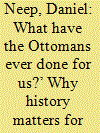| Srl | Item |
| 1 |
ID:
058071


|
|
|
| 2 |
ID:
054948


|
|
|
| 3 |
ID:
124484


|
|
|
|
|
| Publication |
2013.
|
| Summary/Abstract |
Historical sociology has long been concerned with the study of organized state violence. Since the mid-1970s, a substantial body of work has come to focus on the importance of warfare to historical processes of state formation. The first generation of this literature proposed that the relentless existential struggle between the warring polities of medieval Europe had favored the survival of states that could adopt ever more efficient means to extract and mobilize resources from the local population to feed the war effort. Early states therefore evolved the institutions to collect taxes and administer territory largely as a functional byproduct of interstate military competition. From this perspective, the logic of war making was the driving force behind the rise of the modern state in Europe.
|
|
|
|
|
|
|
|
|
|
|
|
|
|
|
|
| 4 |
ID:
185569


|
|
|
|
|
| Summary/Abstract |
Scholars of Middle East politics have been reluctant to explore how the long nineteenth century has shaped the region's political development. The reason for this neglect, I argue, is a common understanding of Ottoman decline and failed modernization, which suggests that the story of modern politics in the Middle East commences with colonial partition after the First World War. But what if political scientists are getting the story wrong? In this article, I argue that our background assumptions about the political development of the Middle East reflect outdated understandings that historians themselves have long left behind. Drawing on this revisionist Ottoman historiography, I show that key dynamics in Middle East politics today—such as state-building and sectarian identities—originate not in the era ushered in by the Sykes–Picot Accord, but in the transformations of the long nineteenth century. By overlooking the evolution of late Ottoman politics and their historical legacies, political scientists risk misdiagnosing key dynamics in the region's political development. ‘Bringing the Ottomans back in’ highlights to policy-makers the importance of the extra-institutional dimensions of statebuilding in the Middle East, and opens up new vistas for research in comparative–historical political science.
|
|
|
|
|
|
|
|
|
|
|
|
|
|
|
|